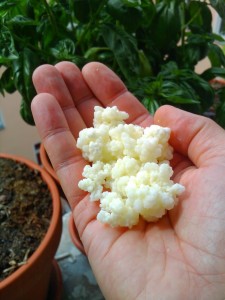Probiotics are bacteria that are good for you. That seems an apparent contradiction. Aren’t bacteria supposed to be bad for you? Actually the number of bacteria living inside you outnumbers your cells by 10 to 1. In fact, some of these bacteria are essential to your health.
Why are they good for you?
The largest concentration of bacteria is in your digestive system and is known as “gut flora”. While humans can live without these helpful bacteria, they are essential to healthy digestion. Certain carbohydrates can’t be broken down without them and they actually produce some vitamins and hormones for your body. They also play a critical role in immunity. By being the first bacteria to populate the newborn’s intestinal lining they essentially train the immune system which bacteria are helpful and which needs to be destroyed. They also compete for resources with harmful bacteria and, when plentiful, can suppress the effects of harmful bacteria.
Why aren’t we getting enough?
The standard American diet (SAD) is nearly devoid of probiotics. Why is that? I think the primary reasons are the advent of refrigeration and the availability of pre-made foods. If you went back a few generations it’s certain you would find your relatives using traditional fermentation practices to produce many foods rich in probiotics. Of course, they had no idea they were making probiotics. They just needed a way to preserve food and in the process provided themselves with many great tasting menu options. Foods traditionally fermented include sourdough, butter, cheese, kefir, brined pickles, ketchup, relish, vinegar, cider, beer, and many others.
What is traditional fermentation?
Traditional fermentation is a process which uses bacteria and enzymes to breakdown the sugars in food. Typically a starter culture is added to the food to begin the fermentation. However, this is not always the case. Sourdough can be started by exposing a flour and water mixture to the air. The healthful bacteria found in the air will eventually populate the mixture and begin the fermentation process.
In the process of eating the sugars and starches in the food, the “good” bacteria preserve the food by colonizing the food and preventing the growth of bacteria which spoil food. Fermented foods can last for long periods of time, sometimes as long as a year.
Fermentation has other benefits besides providing the good bacteria our bodies need. In many foods the fermentation process breaks down elements of the food which are difficult for our bodies to digest. Fermenting can also multiply the available nutrients in the food.
What is the best source of probiotics?
Certainly it’s easy enough to buy probiotic supplements but they’re not the best source of probiotics. Tests of some probiotic supplements have shown them to contain no beneficial bacteria at all! Many probiotics supplements are also destroyed in the acid of the stomach. A further issue to consider is what types of bacteria are they placing in the supplements and are those really beneficial to you.
Foods you prepare yourself are the best source of probiotics. The probiotics in the food you ferment yourself are alive. Only live bacteria can help you. Also, as previously discussed, these fermented foods also contain pre-digested nutrients your body could not otherwise digest. The probiotics in food are also better able to survive the stomach acids they encounter on their way to your intestines.
If you are interested in preparing your own great tasting fermented foods, loaded with probiotics, I give my highest recommendation to a book by Sandor Katz titled “Wild Fermentation”. Good luck and your body will thank you!
Photo 1 – Heusel, M., (Photographer). (2011).Kefir. [Web Photo]. Retrieved from https://picasaweb.google.com
Photo 1 – Heusel, M., (Photographer). (2011).Kefir. [Web Photo]. Retrieved from https://picasaweb.google.com
Written by Peter Wright
Latest posts by Peter Wright, NTP, CGP (see all)
- Dehydrated Broth – Making It Easy to Drink Broth Every Day! - March 11, 2017
- Lose 10 lbs DURING the Holidays - November 19, 2016
- Finding Good Oils - February 7, 2016



I was questioned about the safety of naturally fermented products and found this on the Internet.
Here’s a published quote from Department of Agriculture research microbiologist Fred Breidt:
“With fermented products there is no safety concern. I can flat-out say that. The reason is the lactic acid bacteria that carry out the fermentation are the world’s best killers of other bacteria,” says Breidt, who works at a lab at North Carolina State University, Raleigh, where scientists have been studying fermented and other pickled foods since the 1930s.
Breidt adds that fermented vegetables, for which there are no documented cases of food-borne illness, are safer for novices to make than canned vegetables. Pressurized canning creates an anaerobic environment that increases the risk of deadly botulism, particularly with low-acid foods.
He goes on to say that properly fermented vegetables are safer than fresh ones, which may be carrying E. coli or other pathogens.
Alritz
Posts: 2
Joined: Fri Nov 05, 2010 12:23 am
Top